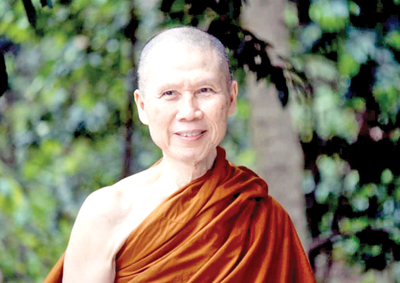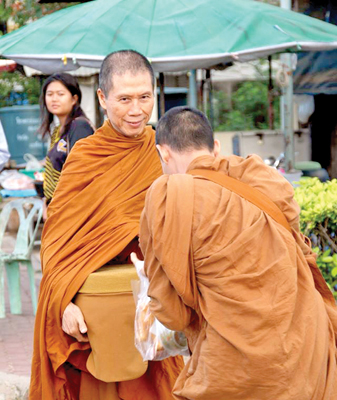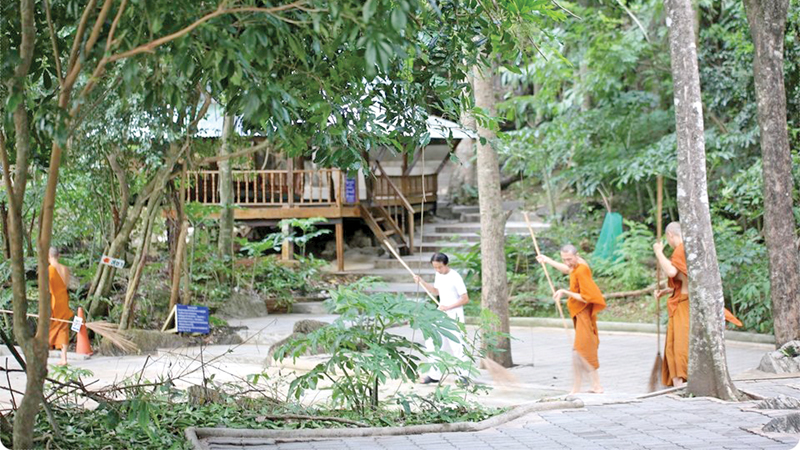The following are excerpts from an interview with Theravada Bhikkhu Ven. Ajahn Suchart Abhijato Maha Thera of Thailand. The Maha Thera is well known across the globe for his effective Dhamma teaching methods and meditation practice.
Q: Vipassana meditation helps us see things clearly and understand the true nature of reality through observing our thoughts, feelings, and sensations without judgment. It also allows us to become more aware and mindful in our daily lives. Could you tell us briefly how to practise vipassana meditation correctly?
A: Vipassana is the development of wisdom or knowledge that will enable us to eliminate the Ten Fetters ( such as Sakkaya Ditti). We have to study the nature of the body to see that there is no self in the body. The body is just made up of the Four Elements and composed of 32 parts. If you take these 32 parts and separate them, you will understand that there is no self in any of these parts. So we sometimes have to mentally dissect the body, part by part.

Ven. Ajahn Suchart Abhijato Maha Thera
For example, gather the hair and place it in one spot, then the skin, the teeth, the nails, and so forth. So eventually you come to see that there is no self in these 32 parts. Then you can understand that the concept of a self in the body is just our delusion, our mind’s delusion. So you may then want to teach your mind to accept this truth and let go of the attachment to the body. You cannot control this body. The body is like the weather, it gets old, it gets sick, and dies.
No one can prevent this process from happening. And if you have any desire not to have the body to get old, sick, or die, you are creating Dukkha –suffering, for yourself, for the mind. If you do not want to undergo Dukkha or suffering then you just have to accept the reality or the truth of this body. You will have to accept that you get old, sick, and die because it is the natural process of breaking up of the Four Elements from the body. So reaching this understanding or reality is called Vipassana.
You also need to understand the nature of feelings. Just like the body, feelings arise and change continuously, and you cannot always control them. Sometimes you have good feelings, sometimes you have bad feelings or you may even have neutral feelings. But your mind only wants good feelings. So the mind is creating Dukkha ( suffering) because of not understanding the nature of feelings – that they change. So you need to teach the mind to accept the other types of feelings as well – good feelings, bad feelings, or neutral feelings. Because they are all part of a natural process just like the body. You will have neither stress nor suffering if you understand the nature of feelings and let them come and go, let them change as they like.
Q: Do we have to analyse the feeling? For example, when we get angry, do we have to analyse the feeling of anger?
A: Well, some of the feelings you can understand by finding the cause of that feeling. Sometimes we have bad feelings because we have expectations from people. We want people to say nice things to us. So when they do not say nice things, we get bad feelings. If we want to eliminate this negative feeling from our mind, we have to stop our expectations. Do not expect people to say nice things to you. Let them say whatever they want to say. Then you won’t get these bad feelings. Bad feelings are beyond your control like the heat or the cold. It is something that you have to teach your mind to accept. If they are feelings that you can control, just ‘delete’ those feelings. But if you come across a type of feeling that you cannot ‘delete’ then you just have to learn to live with it.
Q: We feel angry or sad because we feel that there is a self. When our self-pride is hurt, we tend to react. Correct?
A: Yes,
Q: But when we understand that there is no self in this body, there is no need for us to feel angry, happy, or sad. Have I got it right?
A: That’s right. Do you get angry with the water? Do you get angry with the air, and the wind when it blows? This is Vipassana – seeing the truth, according to the truth, not according to our delusion.
Q: So, Vipassana is not always practised in a deep meditation posture. From what you’ve said, I understand that we can also practise Vipassana during our daily activities
A: Vipassana is not usually practised during meditation, but after it. These are two separate types of practices. When meditating, the goal is to stop thinking and still the mind. But when you want to develop wisdom, you have to think. In other words, to develop wisdom, thinking is essential. So these are two types of practices that you cannot do at the same time. You must choose one or the other.
Q: Can we practise Vipassana while attending to our daily chores?
A: The practice of Vipassana is at two levels. First as homework, and next as taking the examination. First, you have to teach the mind that you can sometimes have painful feelings and the next step is to ‘go and see the dentist’ and have your tooth pulled out and see how your mind reacts to this painful feeling!
Q: Does it mean that we can practise Vipassana through meditation and also while attending to our day-to-day activities?
A: Eventually you have to face it in real time. For example, right now, we are discussing it, which is similar to studying theory or doing homework. We are studying to understand the nature of feelings. But the real test comes when we have to face real situations in our daily lives. It can happen anytime suddenly. You might get a stomach ache for instance. How do you react then? If you react with stress, then you will fail the test. But if you act normally, accepting it as a part of life, then you will pass the test.
Q: For a person who travels long distances daily to work, either by train or bus, how would you advise practising Vipassana?
 A: You can contemplate the 32 parts of the body if you like. You can study the anicca nature of the body – ageing, sickness and death. You can observe the people around you on the bus. They are at different stages of life. Some are young, some are old, some are sick, and some are nearing the end of their life.
A: You can contemplate the 32 parts of the body if you like. You can study the anicca nature of the body – ageing, sickness and death. You can observe the people around you on the bus. They are at different stages of life. Some are young, some are old, some are sick, and some are nearing the end of their life.
Q: But merely practising Vipassana by observing day- to-day activities won’t lead us to Nirvana right? At some point, we have to engage in deep meditation.
A: In deep meditation, one enters the jaanas. You need the jaanas to make the mind neutral, calm, and non-reactive. Once the mind reaches the non-reactive state, then you can teach the mind to face anything – face any painful feeling, even death without reacting to it. (Treating death just like yet another normal thing.) Without equanimity, you will not be able to remain calm and nonreactive when confronted with things you dislike or fear.
So you need deep meditation to make your mind strong, and to develop strong equanimity. This enables you to study the true nature of things that you possess. Studying means understanding that what you believe to be yours does not actually belong to you and that you will eventually lose it, just like your body. So when the time comes to part with your body, having strong equanimity will help you let go with readiness.
Q: What can we do to help our pets or animals get a better next birth?
A: By feeding them you are helping them and preventing them from committing bad kamma. If there is no one to feed them they will have to search for food and may end up stealing or killing to survive, thereby accumulating more bad kamma. That means they will have to remain as animals for a longer period. But, if you can help them by feeding them, you stop them from committing more bad kamma. The bad Kamma they have already accumulated will slowly disappear from their minds. This, in turn, will help them to return to this world as a human being sooner.
Q: Great. When they do not commit any more bad kamma they may potentially attain a better birth?
A: Yes. One’s future birth depends on one’s good or bad kamma. If you continue to commit more bad kamma in this life, your next birth will be worse. However, if you can stop doing bad kamma in this life, then your next birth might be better. It also depends on the amount of bad Kamma that you have already accumulated from your past life. But eventually all your bad kamma will be worked off by being born as an animal, predator, hungry ghost, or whatever. Then you will have a chance to be reborn as a human again.
The goal is to stop committing any more bad kamma and let the consequences of your bad kamma run their course. Once that happens then you can return and be reborn as a human. But if you continue to be born and continue to do more bad kamma, you are only increasing the strength of your bad kamma, pushing you further to be reborn in the lower realm of existence.
So this is why animals that do not have to kill to survive have a better chance of getting a better rebirth next time, because they are not committing any bad kamma.
Q: When we practise mindfulness throughout the day, we stay attentive. Should we also reflect on how well we maintained mindfulness at the end of the day?
A: No. There is no need for that. The goal is to keep thoughts to a minimum. You need to keep your mind calm and empty. So, there is no need to think, unless there is some problem that you have to think of and solve. So if you do not have any problems to solve, then there is no need to go back and reflect. Continue with mindfulness and avoid thinking. Think only when you have to do so.
Q: I always think about animals that get slaughtered. I feel distressed that I cannot do anything to save those innocent lives. Every morning I am troubled by the thought of so many animals being killed for meat. I feel sad and guilty because human beings, being the most intelligent of all on the planet, still depend on the flesh of the innocent for their survival. How can I overcome these feelings?
A: Well. You have to accept that this is the working of the Law of Kamma. This animal must have killed other animals in its past life which is why it is now an animal. So this is a consequence of its past actions. Even though we do not have the ability to look back to the past to see the exact reasons as to why this animal gets killed in this birth, if we study the Law of kamma, we can easily understand that if you kill someone for food one day, you are going to end up being killed by someone else for food in the future.
Q: But isn’t it always good to save animals from being slaughtered whenever possible? Unfortunately, we cannot save them all.
A: Yes. You cannot save all. This is why as part of Buddhist charity practices in Thailand, people sometimes go to slaughterhouses to buy and rescue animals. Similarly, at fish markets people purchase fish and crabs and then release them into the sea or a river to save their lives.
But they may sometimes end up being eaten by other animals. This is simply the way of the world we live in.
Q: Can we change another person’s negative behaviour and harsh treatment towards us solely through cultivating absolute Metta thoughts towards that person? In other words, can bestowing 100 percent Metta on a person completely change their behavior towards us?
A: There is no fixed formula here. Sometimes it is possible, but other times it may not. It depends on the individual that you deal with. If the person is determined to hurt you, however much Metta you show towards them, they might not change their behavior towards you.
But you can try just as the Buddha did with Devadatta. Devadatta tried to kill the Buddha three times. But the Buddha never reacted. The Buddha never retaliated. Eventually, Devadatta realised his wrongdoing and sought forgiveness from the Buddha for his actions. The best way is not to retaliate. The Buddha said “Don’t retaliate when somebody is treating you badly. because retaliation will not stop people from treating you badly.” When you retaliate then they are coming back to you for more, but if you stop and let them do whatever they want, they will stop eventually, once they get tired of their act.
Q: How can we handle subtle forms of discrimination –racial, gender or otherwise- according to the teachings of the Buddha?
A: Just look at everything as you would do with the weather. Can you control the weather? Can you prevent it from raining, or snowing? Can you prevent the Sun from shining? Similarly, you cannot control people’s actions. Let them do whatever they want. If they hurt you, try to stay away from them. It is like staying away from the rain if it harms, you. But if you cannot stay away from the rain, then you just have to get wet.
Sometimes you cannot avoid bad people. You just have to accept that this is part of being born. The Buddha said once you are born, you are subjected to things that you do not like to face such as aging, sickness, death, separation from the ones you love, meeting people or facing situations that you do not like. But you can teach your mind to rise above these things by being calm and not reacting to them. Our problem is that we try to change people to suit our preferences which is impossible. The best approach is to leave people and situations alone and treat everything as a work of nature/part of nature. Treat everything like nature.
Q: Sometimes it is difficult to do so when it affects us directly.
A: This difficulty arises because you may not yet see the stress that you are creating for yourself through reaction. Once you stop reacting and leave things alone, you will feel peaceful and calm. Then you can see the difference between your feelings, reacting and non-reacting. And eventually, you will come to the understanding that it is better not to react.
When you do not react and don’t try to change things, then your mind remains peaceful and calm. But when you try to react and change things, then you may become stressed. The Buddha said this is Dukkha.
If you can change them just go ahead. If they come and ask for your advice, you can explain whether their actions are good or bad. But if they don’t , try not to react.
– Ven. Ajahn Suchart Abhijato Maha Thera was born on November 2, 1947. Having completed his degree in Civil Engineering at California State University, Fresno, USA, he returned to his motherland where he designed an ice cream parlour for a brief stint.
Quite soon, inspired by a Dhamma book, he decided to go in search of “true happiness,” to find inner peace through the practice of Buddhist meditation. He became a bhikkhu at the age of 27 and received ordination at Wat Bovornives in Bangkok on February 19, 1975, with Somdet Phra Ñanasarivara, the late Supreme Patriarch (Somdet Phra Sangharaja), as his Preceptor.
Ven. Ajahn Suchart Abhijato Maha Thera resides in Wat Yansangwararam, Thailand.






